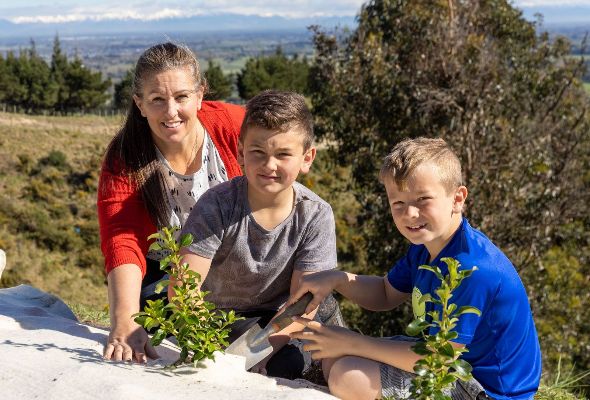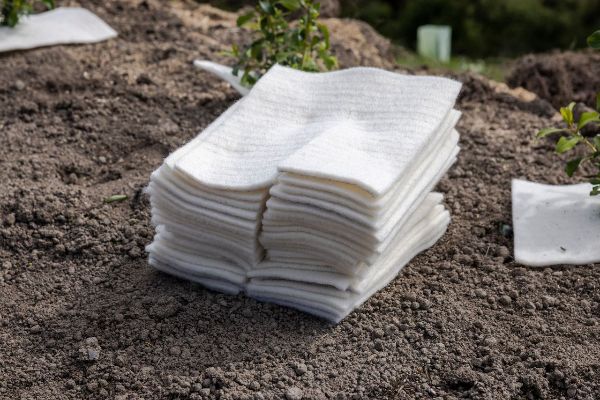Wool Weed Mats Reduce Environmental Footprint
A new weed and mulch mat made from natural New Zealand wool is providing a completely organic and biodegradable option for weed control while helping gardeners reduce their environmental impact and support the agriculture industry.

Wool Life director Stephen Fookes says a key point of difference with their weed and mulch mats is that they contain 100 per cent pure New Zealand wool and are an organic product with a low-carbon sustainable footprint.
“We use a low energy needle punching and carding process to create the mats which are produced at our plant located at Te Poi near Matamata. Using new and untreated wool has benefits over recycled wool as the finished product is completely pure and does not require any chemical treatment. The mats and pegs completely biodegrade over 12-18 months.”

Stephen says wool provides a nurturing environment for new plants with nitrogen, phosphorus and potassium supplied to the soil in optimum amounts as the mats breaks down. Wool’s water retaining properties are also important when considering the environmental benefits of reduced water usage.
“Wool is made up of 16 per cent nitrogen, 3 per cent sulphur and trace amounts of phosphorous and potassium. It is perfectly suited to complement soil nutrition requirements once its weed control function is completed.
“Wool holds up to 33 per cent of its weight as water. It absorbs water into its inner layers and releases it slowly once the relative humidity drops below 65 per cent which reduces the need for watering.”
Tai Tapu lifestyle block owner Michelle Wilson has been trialling Wool Life’s weed and mulch mats in her garden to see how it compares with the coconut matting she previously used to control weeds.
For Michelle, it is important to know exactly what is in the products that she uses around her garden as protecting the environment is a key value for her family and for her business Zing Bokashi.
“I like to know exactly what’s in products, where they are made, where the ingredients come from and if they are local and organic. We like to support local and New Zealand-made products wherever possible.”
Michelle’s property is located on top of a hill which makes it prone to erosion and high winds. She relies on rainwater to water her large garden which includes hundreds of native plants such as flaxes and totara along with a select few non-natives which are used to attract bees to the nearby vegetable garden.
So far, Michelle is impressed with the wool weed mats, especially their water retention properties and the biodegradable plant-based pegs.
“Water is a precious resource to us so anything we can do to save water is important. I love how both the mats and the pegs break down and there is nothing left behind to harm the environment.
“The barbed design of the pegs makes them easy to insert into the weed mat and once they are in, they stay put which is really important on a hilly and windy site like mine.”
Another feature which stands out for Michelle is that the wool repels slugs and snails with tiny naturally occurring barbs in the wool preventing them from crossing the mat.
“I think that will appeal to lots of gardeners because no one likes snails and slugs eating all their new plants.”
Michelle and her family have the long-term goal of leaving their land in a better condition than when they found it and attracting more native wildlife to the area through their planting efforts
“We are all about enhancing the land and bringing more of what is already living nearby like wood pigeons, geckos and bellbirds. I think it’s also really important to be conscious of what we are putting on our soil and what we are leaving behind.”


 NIWA: Students Representing New Zealand At The ‘Olympics Of Science Fairs’ Forging Pathway For International Recognition
NIWA: Students Representing New Zealand At The ‘Olympics Of Science Fairs’ Forging Pathway For International Recognition Coalition to End Big Dairy: Activists Protest NZ National Dairy Industry Awards Again
Coalition to End Big Dairy: Activists Protest NZ National Dairy Industry Awards Again Infoblox: Dancing With Scammers - The Telegram Tango Investigation
Infoblox: Dancing With Scammers - The Telegram Tango Investigation Consumer NZ: This Mother’s Day, Give The Gift Of Scam Protection And Digital Confidence
Consumer NZ: This Mother’s Day, Give The Gift Of Scam Protection And Digital Confidence NZ Airports Association: Airlines And Airports Back Visa Simplification
NZ Airports Association: Airlines And Airports Back Visa Simplification Netsafe: Statement From Netsafe About Proposed Social Media Ban
Netsafe: Statement From Netsafe About Proposed Social Media Ban